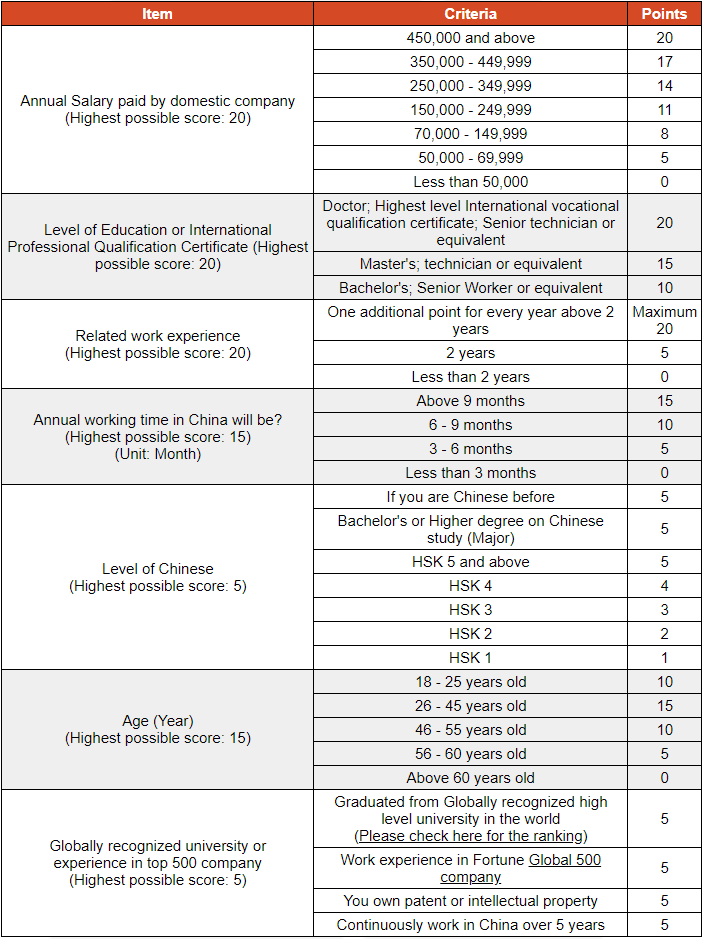To streamline the process, China implemented the "Work Permit" policy on April 1, 2017, merging the former "Alien Employment Permit" and "Foreign Expert Certificate" into a unified certificate known as the "
Foreigner's Work Permit" (FWP). Managing this permit rests with the foreign expert bureau, ensuring efficient administration.
The new policy classifies foreign workers into three distinct categories: Class A (Talent - encouraged), Class B (Specialty - controlled), and Class C (Normal - restricted). To obtain a work permit and the necessary working residence permit, crucial for legal employment in China, meeting the requirements for at least Class C is essential. To determine your specific category, refer to the eligibility criteria for Category A, B1, B2, B3, B4, C1, C2, and C3.
Let's explore the eligibility criteria for Class A:
Class A primarily caters to highly skilled expatriates known as "High Incoming Earners." To qualify for Class A, you must satisfy the following conditions:
Your annual salary should exceed 600,000 RMB.
You must fulfill the requirement of paying income tax based on your salary.

If you don't meet the criteria for Class A, it is advisable to assess your eligibility for any of the following Class B categories, which are more applicable to the majority:
B1: If you possess a Bachelor's degree and have at least two years of full-time work experience in a relevant field after graduation, you may be eligible for a B1 work permit.
B2: For individuals in the technology sector, having a salary equal to or greater than four times the average monthly wage in Shanghai (approximately 33,334 RMB per month in 2020) is crucial. The government will verify your income tax receipts the following year to determine eligibility.
B3: If you are a foreign language teacher (native speaker) in China, holding a Bachelor's degree or higher and having a minimum of two years of full-time teaching experience are necessary. However, if your major is in Education, Language, or Teaching or you possess a recognized TEFL certificate, the two-year teaching experience requirement may be waived.
B4: The B4 category evaluates personal comprehensive quality through a scoring system. To qualify, you must achieve a minimum score of 60 points on the provided score sheet.

If you don't meet the requirements for a Class B work permit, it is worth examining whether you qualify for any of the following Class C categories:
C1: Recent graduates in China or graduates from a top 500 overseas university within the past two years, holding a Bachelor's degree, and employed by a company registered in Shanghai Free Trade Zone (FTZ), Zhang Jiang national innovation demonstration zone, Lingang special area, Hongqiao central business district, or any of the five new towns (Jiading, Qingpu, Songjiang, Fengxian, and Nanhui), or those employed by companies listed in the China sci-tech innovation occupation list, may be eligible for a C1 work permit.
C2: Recent graduates in China or graduates from a top 500 overseas university within the past two years, holding a Master's degree or higher (with a score of at least 80/100 or B+/B over the average), and employed by a company registered in China, may qualify for a C2 work permit.
C3: Those participating in the French Intern <1000 plan=""> or the German intern
in a China-based company, with an internship duration of less than six months, may be eligible for a C3 work permit.
Understanding the distinct categories and their corresponding eligibility criteria will help you determine the appropriate work permit category that aligns with your situation in China.


